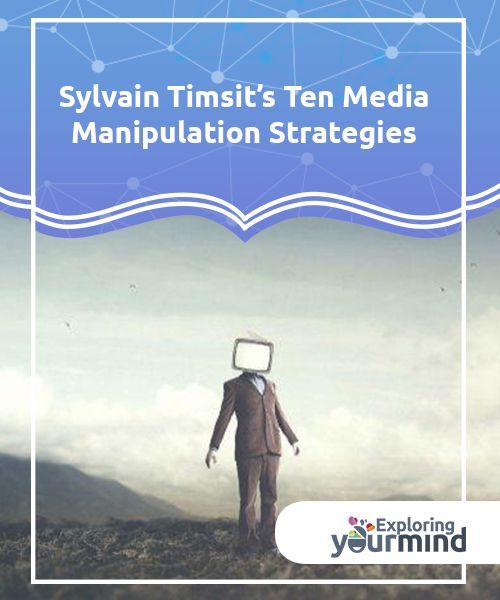Historically the media has shown that this is a very effective way of shaping public opinion, thanks to them social movements were created or destroyed, financial crises were hidden and ideological currents were stimulated, from this perspective various studies and theories have emerged, such as Sylvain Timsit’s media manipulation strategies.
This idea is usually attributed to Noam Chomsky, albeit in the wrong way, because the intention of the French writer was to highlight the psychosocial tools that allow the public to be distracted from what is really important, in this way, the real problems suffered by the French writer. The population is obscured by the manipulation of public opinion with the help of the media, leaving society more submissive and less critical.
- The first of Sylvain Timsit’s media manipulation strategies is distraction.
- As it is the primary element of control over society.
- Distraction distracts audiences from important issues.
Flooded with distractions and continuous information on trivial topics, the public will not be interested in the essential topics of politics, culture, economics or social problems, it is about keeping attention away from real social problems, attracting the people towards minor problems. the public busy with banalities, without time or space to think.
This method is to create a problem to provoke a certain public reaction, and to make it accept or even willingly ask for the necessary measures to solve the problem that the government wanted to implement from the beginning.
For example, creating an economic crisis that citizens will accept as a “necessary evil. “The decline in labour rights and the precariousness of public services. Another example is to allow urban violence to develop or intensify, so that citizens demand repressive policies. .
It is a question of accepting an unacceptable measure by applying it gradually, gradually, even over the years. For some, radically new socioeconomic conditions, such as neoliberalism, prevailed during the 1980s and 1990s, privatizing and increasing precariousness.
Another way to accept an unpopular decision is to present it as “painful, but necessary,” gaining public acceptance for the time being with the promise of implementing it in the future. It is easier to accept a future sacrifice than an immediate sacrifice. because effort should not be made immediately. This gives the masses more time to get used to the idea of change and accept it with resignation when the time comes.
Most public advertising is done through rather puerile speeches, arguments, characters and intonations, as if the viewer were not mature or did not have the ability to understand certain ideas, in this way, when it comes to deceiving the public, the audience can react even more childishly.
Using the most emotional side of people is a classic technique to avoid rational analysis of a situation, as well as its critical sense, on the other hand, the use of an emotional record requires instinctive behavior, based mainly on desires or fears.
Another of Sylvain Timsit’s media manipulation strategies is to ensure that the public does not understand the technologies and methods used to control them, this applies to reductions in education, reductions in teachers, scholarships, specialized teachers, careers impossible for much of the population, etc.
Encourage the belief that it is right and modern to be a vulgar, uneducated, un intelligent or correct person, as you can see in many TV shows.
To make the individual believe that he is responsible for his own misfortune due, above all, to his lack of intelligence, his lack of skill or effort; so, instead of rebelling against the system, the individual blames himself and devalues himself.
Sylvain Timsit’s latest media manipulation strategies are based on the development of a system that allows us to learn more about the individual than on himself, through techniques such as biology, neuroscience or psychology, which will allow great control over the masses.
Knowing these strategies will not prevent certain interests from continued to use them in your favor, but it will allow us (as individuals from a very large group: society) to decide the extent to which we will allow them to influence us or how we will do so. we react when we detect them.

